Quality Control in Automotive Industry
In the automotive industry, product quality is an important issue as it is linked to safety and human life. And the ...
By AMREP | Posted on February 19, 2025
Companies rely on QC professionals to detect defects, prevent errors, and improve processes. But what skills are necessary for success in this field? To excel in Quality Control, professionals need a unique blend of technical expertise, analytical thinking, and interpersonal abilities.
In this blog, we’ll explore the core skills needed to succeed in quality control and how these abilities play a pivotal role in enhancing overall business performance.
Quality Control (QC) Testing refers to the process of evaluating and inspecting products or services to ensure they meet predefined standards of quality. The primary goal of QC testing is to identify any defects, inconsistencies, or potential issues before a product is released to the market or a service is provided to customers. QC testing plays a crucial role in maintaining high-quality standards and customer satisfaction.Quality control skills are crucial for improving your ability to notice small details, solve problems, and enhance your efficiency. Many roles, such as quality assurance and quality supervision, make quality control the core of their responsibilities. These are skills that can be developed over time, not only within the quality control field but also across various industries. As the industry evolves, so do the work procedures, standards, and testing requirements that employers may need to implement.
In addition to technical expertise, skills like organization, leadership, and communication are highly transferable and valuable across different roles. Professionals who take pride in ensuring that products meet the highest standards before they reach customers often find fulfillment in this field. Adaptability is also essential, as standards and expectations can vary from one employer to another. A commitment to ongoing professional development is also key, as it enables you to stay updated and improve in a dynamic industry.
Read more: QC Tests and Checks in Quality Management
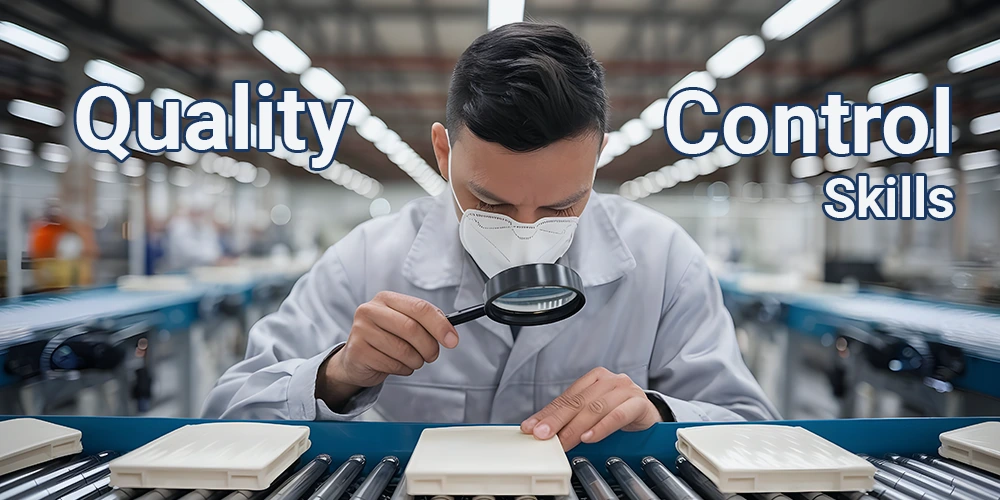
To excel in QC, professionals must possess a unique set of skills that not only address technical aspects but also focus on analysis, communication, and problem-solving. Let’s explore these essential skills.
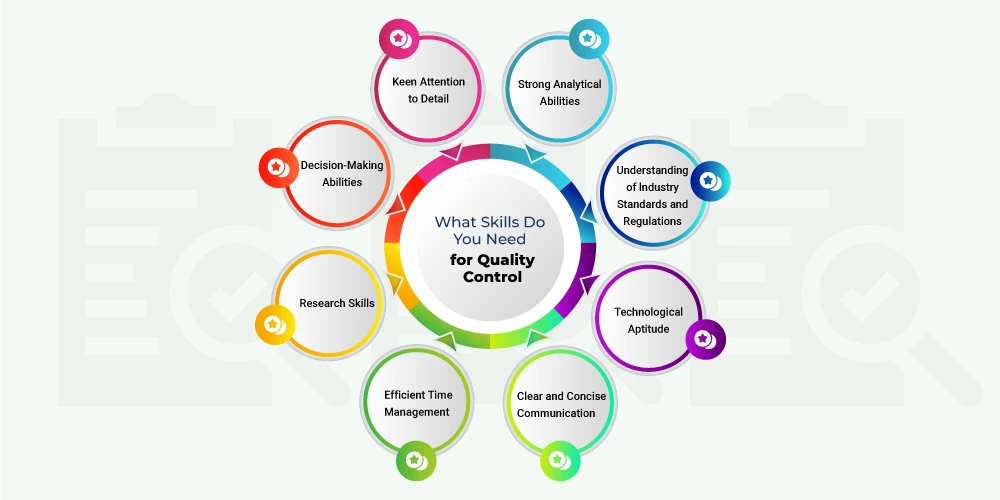
A QC professional’s ability to pay attention to the smallest details can make all the difference. From spotting minute flaws in design to detecting production errors, being detail-oriented ensures that nothing is overlooked. A slight deviation in measurements or a hidden defect could compromise the product’s quality, making attention to detail a non-negotiable skill in quality control.
QC requires individuals who can sift through data, test results, and observations to find meaningful insights. Analytical skills are critical for recognizing patterns, identifying trends, and evaluating whether a product meets required specifications. Being able to assess data accurately allows QC professionals to make informed decisions about quality and potential improvements.
In quality control, adherence to established standards is crucial. Professionals need a comprehensive understanding of industry-specific guidelines and certifications like ISO 9001, Six Sigma, or local regulations. Knowledge of these standards ensures compliance and assures customers that products are manufactured according to the highest industry benchmarks.
Technology plays a major role in shaping quality control practices. Advances in technology bring improved methods for monitoring quality, enhancing production processes, and optimizing the use of materials.
For example, automated weighing machines, precise measuring instruments, and advanced counting devices are becoming more common in quality control environments. Being technologically literate is essential as more businesses rely on specialized software and equipment to track product quality. By familiarizing yourself with the latest tools and technologies, you can enhance your effectiveness in the role, improve efficiency, and keep up with industry trends.
Being able to communicate findings clearly and concisely is critical in QC. Whether it’s sharing test results, reporting defects, or explaining the need for changes to a process, effective communication helps ensure that everyone involved in production is aligned with quality goals. This skill is particularly important when interacting with team members, managers, or other departments that may need to take corrective actions based on QC findings.
Quality control professionals often work with tight deadlines and must manage multiple tasks simultaneously. The ability to prioritize tasks, stay organized, and complete inspections and tests within set timeframes is essential to avoid bottlenecks. Good time management ensures that quality checks do not delay production and that all areas are assessed without sacrificing thoroughness.
Quality control professionals often engage in research and development activities to improve existing processes, test new equipment, or evaluate new software. This can include experimenting with different production methods, assessing the impact of new technology, or investigating ways to increase efficiency. Strong research skills—combined with determination and a keen eye for detail—are crucial in these situations. The more experience you gain in researching and evaluating data, the easier it becomes to innovate and contribute to your organization’s growth.
Effective decision-making is an essential skill for quality control professionals. After gathering and analyzing data, you’ll often need to make decisions that can impact production or process improvements.
For example, you might suggest changes to a manufacturing process based on your findings or recommend adjustments to quality standards. The decisions you make can have a significant effect on the quality of hundreds or even thousands of products, making it important to back up your decisions with solid data and logical reasoning. A strong ability to make informed, data-driven decisions will help enhance the quality of the product and streamline overall operations.
Read More: Quality Control Methods
As a Quality Control (QC) Manager, it's important to continually upgrade your skills to stay relevant in a rapidly evolving field. Upskilling allows you to not only improve your performance but also enhance the overall quality of the products and services you oversee. Here’s a look at several ways you can upskill and grow as a QC Manager.
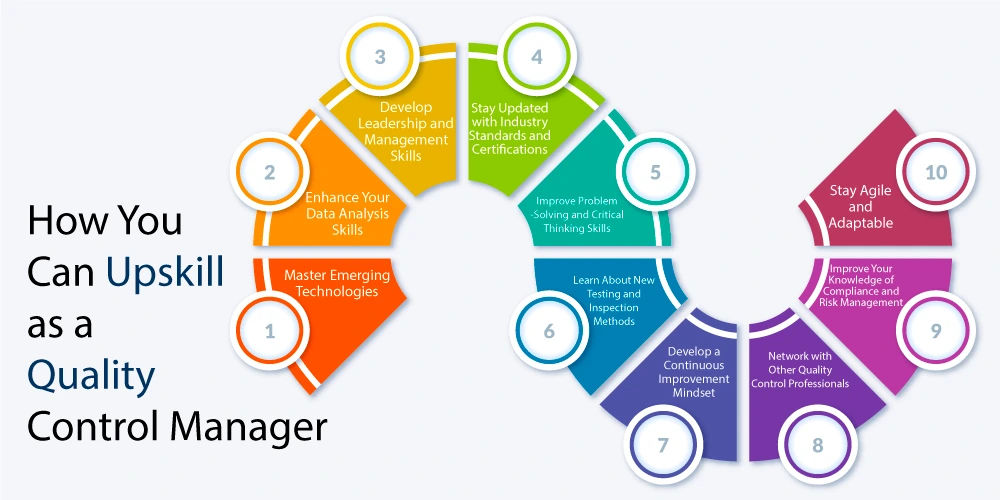
Investing time in learning new tools or upgrading existing systems can improve your team's efficiency and product quality.
As a QC Manager, data is at the core of your work. Learning how to interpret complex data, identify trends, and generate actionable insights will allow you to make more informed decisions and improve quality outcomes.
A Quality Control Manager needs to effectively lead a team, communicate with other departments, and manage projects. Enhance your skills in conflict resolution, team motivation, and project management. Additionally, improving your communication skills can help you collaborate effectively with other departments, like production and supply chain teams, ensuring smooth operations across the board.
Quality standards and regulatory requirements are constantly changing across industries. As a QC Manager, it’s crucial to stay informed about updates to industry standards like ISO 9001, Six Sigma, Lean Manufacturing, and others that are relevant to your field. Consider obtaining certifications to deepen your expertise, such as Six Sigma certifications (Green Belt, Black Belt) or ISO 9001 auditor training. These certifications not only increase your credibility but also give you advanced tools to enhance your quality control processes.
QC Managers often face complex problems that require quick solutions. Strengthening your critical thinking and problem-solving skills will help you address challenges effectively.
Technology and research are constantly improving testing and inspection methods. As a QC Manager, staying updated on new tools and techniques will allow you to improve product quality more efficiently. For example, consider learning about automated inspection systems, non-destructive testing methods, or advanced measurement tools.
Familiarize yourself with methodologies like Kaizen, Lean, Six Sigma, and Total Quality Management (TQM) to foster a culture of continuous improvement within your team. Participate in workshops or seminars on these principles to learn how to optimize processes, reduce waste, and enhance efficiency.
Building a network of peers in the quality control industry can provide valuable insights and opportunities. Attend industry conferences, workshops, and seminars to stay informed about the latest trends and best practices. Networking can also help you gain access to new ideas, strategies, and tools to implement in your quality control processes. Engaging with a community of professionals can broaden your perspective and help you grow both personally and professionally.
Understanding the legal requirements and risks associated with product quality will allow you to ensure that your organization adheres to all relevant laws and avoids costly mistakes. Consider taking courses on risk management, compliance, and legal regulations related to your industry.
The field of quality control is always evolving, so it's important to be agile and adaptable. Embrace change by being open to new approaches and methods.
Upskilling as a Quality Control Manager is a continuous process of learning, adapting, and improving. Through continuous professional development, you’ll not only enhance your career but also play a key role in driving innovation and success in your organization.
As we’ve explored, quality control is a dynamic field that requires a unique blend of skills to ensure product excellence. At AMREP Inspect, we specialize in Product Quality Management, helping businesses achieve the highest standards of quality by leveraging our expertise and advanced solutions. Reach out to us today and let AMREP Inspect be your trusted partner in ensuring quality and efficiency in every step of your production process.
Contact Us To See What We Can Do
Call Us
Mon - Sat 9.00 - 18.00
Sunday Closed


22 - January 2025
22
January
2025
In the automotive industry, product quality is an important issue as it is linked to safety and human life. And the ...
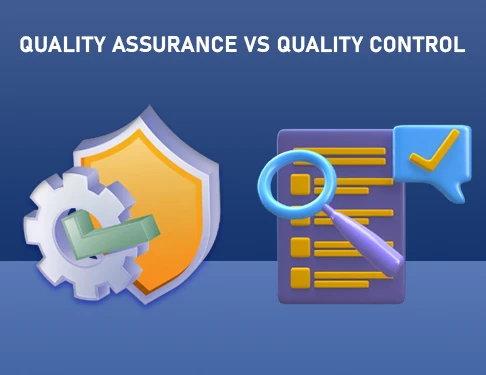
07 - January 2025
07
January
2025
The emphasis on customer satisfaction and continuous quality improvement is central to both quality assurance and quality control. Quality assurance ...
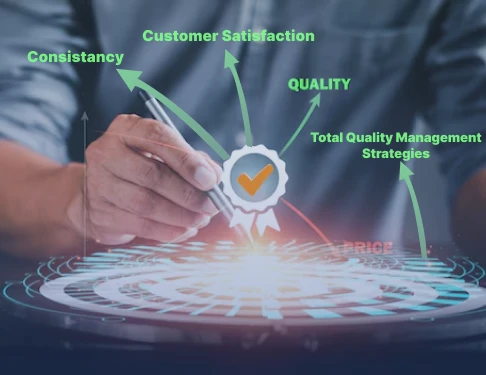
20 - December 2024
20
December
2024
Quality is a key differentiator for success, and organizations must adopt strategies that drive continuous improvement and customer satisfaction. Total Quality Management...
